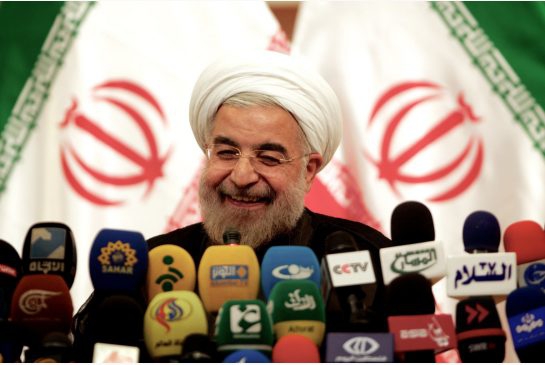 Why can�t the tortuous Israeli-Palestinian conflict be resolved when the solution is so simple? And why can�t there be peace between Iran and the West when all signs indicate that Iran wants a deal? Somewhat incredibly, given the culture of cynicism and pessimism surrounding the region, we are on the brink of finding some answers.
Why can�t the tortuous Israeli-Palestinian conflict be resolved when the solution is so simple? And why can�t there be peace between Iran and the West when all signs indicate that Iran wants a deal? Somewhat incredibly, given the culture of cynicism and pessimism surrounding the region, we are on the brink of finding some answers.In the bloody history of the modern Middle East, historians may one day look back at this past week as momentous. But whether this period leads to historic breakthroughs or another catastrophic war will crucially depend on whether today�s leaders � who, up to now, have been mired in self-serving political expediency � show enough courage, finally, to act in their peoples� long-term interests.
The pivotal and intertwined stories of Israel, Palestine and Iran are about to begin new, unscripted chapters. Last Tuesday, U.S. Secretary of State John Kerry�announced that Israeli and Palestinian negotiators will launch formal peace talks�intended to reach a comprehensive agreement within nine months leading to creation of an independent Palestinian state. It is widely regarded by observers as the last chance to achieve a �two-state solution� in the region. The consequences of failure are incalculable.
This weekend, the new president of Iran,�Hasan Rowhani, will formally take office amid fresh optimism in Iran, the U.S. and Europe that he is ready to engage in serious talks about his country�s nuclear plans and its troubled relationship with the West. In the days leading up to Rowhani�s inauguration on Sunday, there have been�several new accounts�in American and European newspapers � quoting Western diplomats � about Rowhani�s efforts in late 2003 when he was Iran�s chief nuclear negotiator to halt a clandestine program run by the country�s Revolutionary Guards to produce a nuclear weapon.
It will be months before we know whether the Israeli-Palestinian negotiations have a chance, and given the history of past failures, the odds are long. But there are differences today, and there is reason for slight optimism. Not since the 1990s has an American secretary of state been so determined to resolve the conflict. And for the first time, there seems to be growing acceptance in Israel of what President Barack Obama warned will lie ahead if a two-state solution is unachievable: the end of Israel as a Jewish state.
What Kerry and the Americans know is the hidden secret of the age-old Israeli-Palestinian conflict. In broad strokes, there is already a comprehensive peace agreement understood by both parties that enjoys wide support among Israelis, Palestinians and the international community. The only thing missing has been the political will and courage of the Israeli and Palestinian leaders to make it happen.
For Israel�s Benjamin Netanyahu, Iran and its controversial nuclear program have been a welcome political distraction, even though there still is no evidence Iran wants a nuclear bomb. But Rowhani is a different challenge.
Next week, in a gesture that would be seen as conciliatory by the U.S., Rowhani is expected to name Mohammad Javad Zarif, former ambassador to the United Nations, as Iran�s new foreign minister. Zarif, who is well known by the Americans, was involved in confidential bilateral negotiations between Tehran and Washington.
That is another hidden secret known by the Americans. In 2003, the U.S. rejected an unprecedented offer by Iran to make peace. Shortly after the American invasion of Iraq in March 2003, the Iranian government approached the U.S. and proposed a broad dialogue that would include all key issues between the two countries � including its nuclear program, acceptance of Israel and the end of Iranian support of Palestinian militant groups. But, hopeful that the Iranian government was about to fall, this was rejected by the Bush administration and Iran was instead targeted as part of the �axis of evil.�
Will this week�s developments lead to historic breakthroughs or some catastrophic war in the future? No one yet knows. But in a Middle East currently scarred by the horrors of Syria and the chaos within Egypt, it is encouraging that peace � potentially at least � is still an option for these parts of the region.
By The Star
The Iran Project is not responsible for the content of quoted articles.











